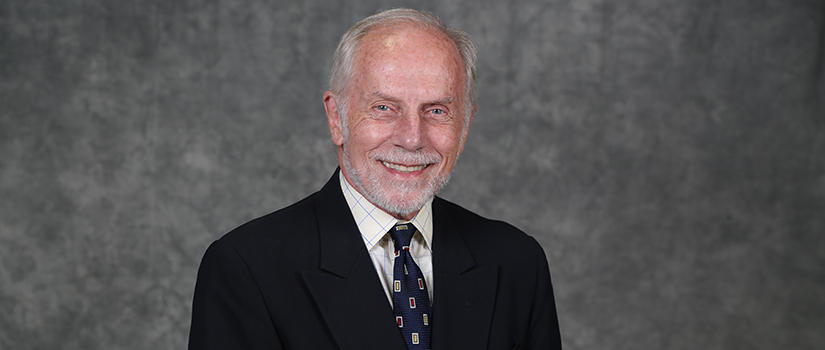Charles Bierbauer joined the University of South Carolina in 2002 following a distinguished 30-year career in journalism, most notably working as a correspondent for ABC News and CNN. He was the first dean of the newly merged College of Mass Communications and Information Studies (now the College of Information and Communications). He retired in 2018.
I’ve been watching the war in Ukraine unfold, in no small measure, through the eyes of Isabelle Khurshudyan. Isabelle is a Moscow-based correspondent for The Washington Post and a 2014 alumna of our School of Journalism and Mass Communications.
A few years ago, over coffee in Washington, Isabelle and I discussed her dream of being a foreign correspondent. She was already a sportswriter for the Post, covering NHL hockey and using her fluency in Russian to gain the confidence of some of the Washington Capitals’ Russian players. She wanted to do more. And I had been a Moscow correspondent for ABC News in the late 70s and early 80s.
Isabelle got there on her own, of course. I’d been following her reports from around Russia until a few weeks ago. The Post then sent her to Ukraine in anticipation that if war broke out, it might be difficult to get there from Moscow. To date, she has reported on the siege of Kharkiv and the tense anticipation of Odesa. I’m using Ukrainian spellings.
I’d driven through Kharkiv decades ago when the road signs in Russian said Kharkov. I never made it to Odesa/Odessa, but it’s the setting of a famous scene from Sergei Eisenstein’s 1925 movie Battleship Potemkin. The sailors of the Potemkin mutiny and the citizens of Odessa support them, only to be mowed down by a troop of Cossacks on the Odessa steps above the harbor. Substitute Putin’s troops for the Czar’s Cossacks and you have today’s confrontation between Russians and Ukrainians.
In a recent interview, Isabelle wondered if she’d be allowed back to Moscow if or when the war ends. It’s a fair concern. Vladimir Putin is, from all we can judge, an unforgiving autocrat. That is in the mold of Russian governance. In 1980, I left Moscow to become ABC’s bureau chief in West Germany, but anticipated a return for the Moscow summer Olympics. Soviet authorities would not let me back. I finally got back to Moscow on the coattails of President Reagan’s visit for his 1988 summit with Mikhail Gorbachev.
In my day, I got my share of chastisement in the Soviet press. On one occasion, I was a “seeker of canards.” No, not ducks. On another, my Russian driver’s license was confiscated. (I was still covered by an international license.) My apartment was broken into and a few items taken, likely as intimidation. I was roughed up and arrested while filming an anti-war demonstration in Red Square. Police told me it was an “illegal demonstration” and, therefore, illegal to film it. Decades later, that reasoning seems to have been prophetic.
There is little doubt that there is a war going on in Ukraine. But Russia has threatened journalists who call it “war” with arrest and up to 15 years imprisonment. It’s a “special military action.” The intimidation caused some independent Russian media to shut down and some international media to suspend their reporting from Russia. Old habits, like Russia’s succession of oppressive regimes, die hard.
While Isabelle and I have shared some apprehensions and challenging working conditions, there are also some differences. Above all, the media environment has been transformed. To file a story from Moscow, I could first send my script by telex from a punched paper tape. I needed to book an international phone call hours in advance to transmit my narration. The iPhone had not yet been invented. To feed film (yes, film) or do a live report, I’d go to Gosteleradio, Soviet television, for a satellite feed. If the censors didn’t like something I said, they could pull the plug. Sometimes, they did. If the story I had was especially sensitive, I’d get on a plane with my film and fly westward to the other side of the Iron Curtain.
Cell phones and satellite transmission kits in a backpack and the internet and social media have changed the communications landscape. Nearly ubiquitous credit cards and ATMs have helped, too. Isabelle and her war correspondent colleagues can get to places and tell their stories in ways once unimaginable. That’s true almost anywhere, not just in Russia or Ukraine. The places we can go. The stories we can tell. The risks we can take.
War reporting is not for the fearless. Fear is to be respected. Wars waged irrationally — is there any other way — are especially dangerous. It’s said that the first casualty of war is truth. One reason journalists take the risks is to put the lie to the terror visited on the people who always bear the brunt of war’s death and devastation.
For the most part, I saw only the Cold War. I’m encouraged that journalists are there but worry for Isabelle Khurshudyan and the others who are in Ukraine so we can have a clear picture of what is happening. Few want to be there; most feel they need to be there.
